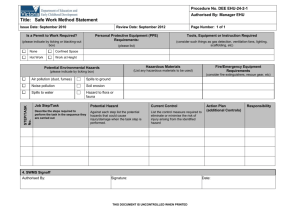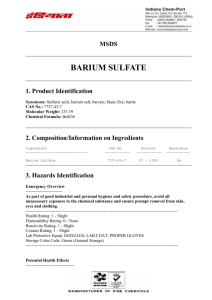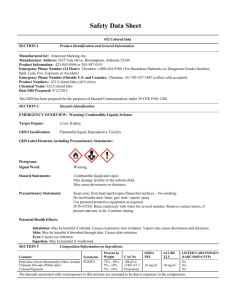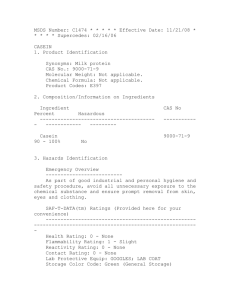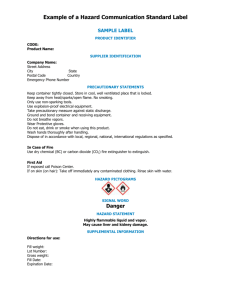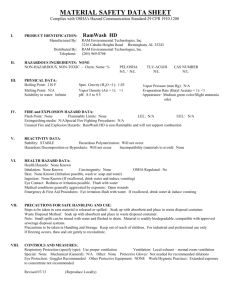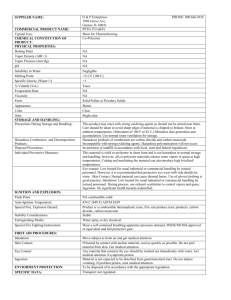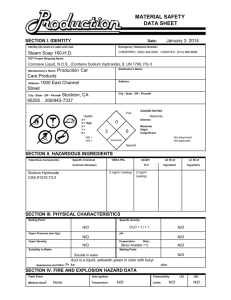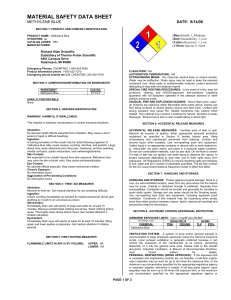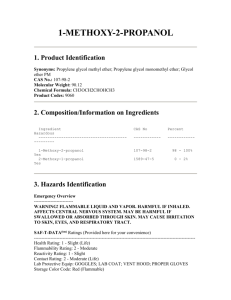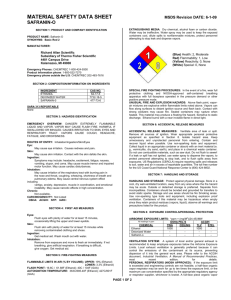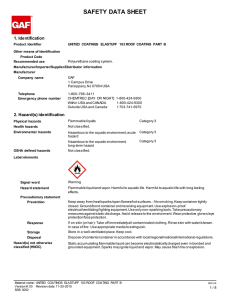Cilgen Brilliance Liquid Color Red 1 MSDS
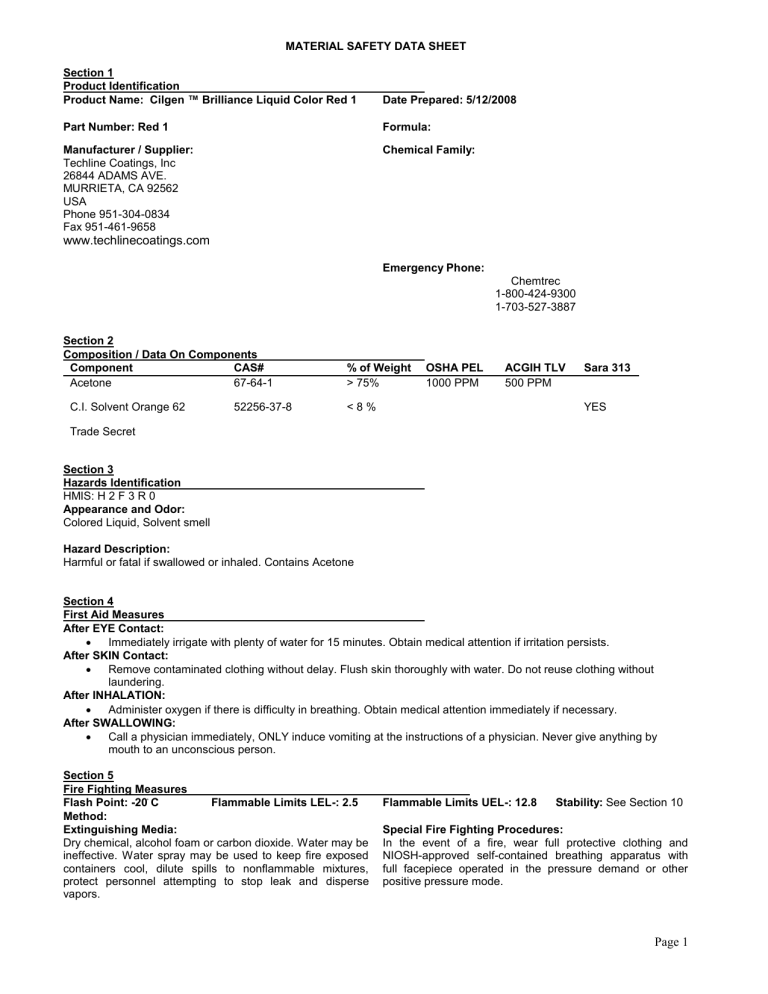
MATERIAL SAFETY DATA SHEET
Section 1
Product Identification
Product Name: Cilgen ™ Brilliance Liquid Color Red 1 Date Prepared: 5/12/2008
Part Number: Red 1 Formula:
Chemical Family: Manufacturer / Supplier:
Techline Coatings, Inc
26844 ADAMS AVE.
MURRIETA, CA 92562
USA
Phone 951-304-0834
Fax 951-461-9658
www.techlinecoatings.com
Emergency Phone:
Chemtrec
1-800-424-9300
1-703-527-3887
Section 2
Composition / Data On Components
Component CAS#
Acetone 67-64-1
% of Weight OSHA PEL ACGIH TLV Sara 313
> 75% 1000 PPM 500 PPM
C.I. Solvent Orange 62
Trade Secret
52256-37-8 < 8 % YES
Section 3
Hazards Identification
HMIS: H 2 F 3 R 0
Appearance and Odor:
Colored Liquid, Solvent smell
Hazard Description:
Harmful or fatal if swallowed or inhaled. Contains Acetone
Section 4
First Aid Measures
After EYE Contact:
Immediately irrigate with plenty of water for 15 minutes. Obtain medical attention if irritation persists.
After SKIN Contact:
Remove contaminated clothing without delay. Flush skin thoroughly with water. Do not reuse clothing without laundering.
After INHALATION:
Administer oxygen if there is difficulty in breathing. Obtain medical attention immediately if necessary.
After SWALLOWING:
Call a physician immediately, ONLY induce vomiting at the instructions of a physician. Never give anything by mouth to an unconscious person.
Section 5
Fire Fighting Measures
Flash Point: -20۫ C
Method:
Flammable Limits LEL-: 2.5
Flammable Limits UEL-: 12.8
Stability: See Section 10
Extinguishing Media:
Dry chemical, alcohol foam or carbon dioxide. Water may be ineffective. Water spray may be used to keep fire exposed containers cool, dilute spills to nonflammable mixtures, protect personnel attempting to stop leak and disperse vapors.
Special Fire Fighting Procedures:
In the event of a fire, wear full protective clothing and
NIOSH-approved self-contained breathing apparatus with full facepiece operated in the pressure demand or other positive pressure mode.
Page 1
Unusual Fire And Explosion Hazards:
Extremely Flammable Liquid and Vapor! Vapor may cause flash fire. Above flash point, vapor-air mixtures are explosive within flammable limits noted above. Vapors can flow along surfaces to distant ignition source and flash back.
Contact with strong oxidizers may cause fire. Sealed containers may rupture when heated. This material may produce a floating fire hazard. Sensitive to static discharge.
Section 6
Accidental Release Measures
Ventilate area of leak or spill. Remove all sources of ignition. Wear appropriate personal protective equipment as specified in Section 8. Isolate hazard area. Keep unnecessary and unprotected personnel from entering. Contain and recover liquid when possible. Use non-sparking tools and equipment. Collect liquid in an appropriate container or absorb with an inert material (e. g., vermiculite, dry sand, earth), and place in a chemical waste container. Do not use combustible materials, such as saw dust. Do not flush to sewer! If a leak or spill has not ignited, use water spray to disperse the vapors, to protect personnel attempting to stop leak, and to flush spills away from exposures. US Regulations (CERCLA) require reporting spills and releases to soil, water and air in excess of reportable quantities. The toll free number for the US Coast Guard
National Response Center is (800) 424-8802.
J. T. Baker SOLUSORB(tm) solvent adsorbent is recommended for spills of this product.
Additional Information:
See Section 7 for safe handling information.
See Section 8 for PPE information
See Section 13 for disposal information
Section 7
Handling and Storage
Protect against physical damage. Store in a cool, dry well-ventilated location, away from any area where the fire hazard may be acute. Outside or detached storage is preferred. Separate from incompatibles. Containers should be bonded and grounded for transfers to avoid static sparks. Storage and use areas should be No Smoking areas. Use non-sparking type tools and equipment, including explosion proof ventilation. Containers of this material may be hazardous when empty since they retain product residues (vapors, liquid); observe all warnings and precautions listed for the product.
Wash thoroughly after handling
Keep out of reach of children and animals. Do not reuse container.
Section 8
Exposure Controls and Personal Protection
Ventilation System:
A system of local and/or general exhaust is recommended to keep employee exposures below the Airborne Exposure
Limits. Local exhaust ventilation is generally preferred because it can control the emissions of the contaminant at its source, preventing dispersion of it into the general work area. Please refer to the ACGIH document, Industrial Ventilation, A Manual of Recommended Practices, most recent edition, for details.
Personal Respirators (NIOSH Approved):
If the exposure limit is exceeded, a half-face organic vapor respirator may be worn for up to ten times the exposure limit or the maximum use concentration specified by the appropriate regulatory agency or respirator supplier, whichever is lowest. A full-face piece organic vapor respirator may be worn up to 50 times the exposure limit or the maximum use concentration specified by the appropriate regulatory agency or respirator supplier, whichever is lowest. For emergencies or instances where the exposure levels are not known, use a full-face piece positive-pressure, air-supplied respirator. WARNING: Airpurifying respirators do not protect workers in oxygen-deficient atmospheres.
Skin Protection:
Wear impervious protective clothing, including boots, gloves, lab coat, apron or coveralls, as appropriate, to prevent skin contact.
Eye Protection:
Use chemical safety goggles and/or a full face shield where splashing is possible. Maintain eye wash fountain and quickdrench facilities in work area.
Section 9
Physical And Chemical Properties
Boiling Point:
Melting Point:
Solubility in Water:
Reactivity in Water:
SECTION 10
STABILITY AND REACTIVITY
Stability:
56.5C
-95C
Miscible
N/E
Stable under ordinary conditions of use and storage.
Page 2
Hazardous Decomposition Products: decomposition.
Hazardous Polymerization:
Incompatibilities:
Carbon dioxide and carbon monoxide may form when heated to
Will not occur.
Concentrated nitric and sulfuric acid mixtures, oxidizing materials, chloroform, alkalis, chlorine compounds, acids, potassium t-butoxide.
Conditions to Avoid: Heat, flames, ignition sources and incompatibles.
Section 11
Toxicological Information
Effects on Eyes:
Effects on Skin:
N/E
N/E
Effects from Inhalation: N/E
Effects from Swallowing: N/E
Section 12
Ecological Information
General Comments: Do not allow material to be released into the environment without proper governmental permits
Section 13
Disposal Considerations
Waste Disposal Method: Disposal should be made in accordance with federal, state and local regulations.
Whatever cannot be saved for recovery or recycling should be handled as hazardous waste and sent to a RCRA approved incinerator or disposed in a RCRA approved waste facility. Processing, use or contamination of this product may change the waste management options. State and local disposal regulations may differ from federal disposal regulations. Dispose of container and unused contents in accordance with federal, state and local requirements.
Section 14
Transportation Information
Hazardous for Shipping: Yes
UN1263, Paint, 3, PGII
May be classified as ORM-D in consumer packaging
Section 15
Regulations
Product Related Hazard Information: N/E
Hazard Symbols:
Risk Phrases:
Safety Phrases:
National Regulations:
N/E
N/E
N/E
SARA Title III 313 Reportable C.I. Solvent Orange 62 is reportable as a
Chromium Compound
Information about Limitation or Use: N/E
Other Regulations, Limitations, and Prohibitive Regulations:
Section 16
N/E
Other Information
This information is furnished without warranty, representation, inducement or license of any kind, except that it is accurate to the best of Tech Line Coatings, Inc., knowledge or obtained from sources believed by Tech Line
Coatings, Inc. to be accurate. Tech Line Coatings, Inc. does not assume any legal responsibility for use or reliance upon same. Before using any chemical, read its label, instructions and material safety data sheet.
